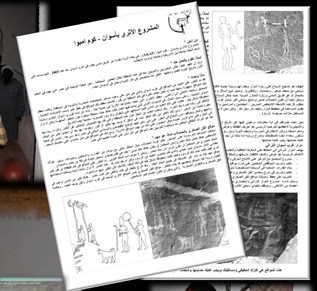Aswan – Kom Ombo (Egypt)
AKAP - Aswan-Kom Ombo Archaeological Project

Coordinator/Mission Manager
Antonio Curci and Maria Carmela Gatto (Polish Academy of Sciences)
Field of research and classifications
Archaeological disciplines from prehistory to the medieval age
VRA: Area 10
ERC: SH6, The Study of the Human Past.
SDGs: 11) Sustainable cities and communities; 17) Partnerships for the goals.
Prevalent type of public engagement
Participation in urban development projects and heritage valorization.
Publications (print and digital) for non-academic audiences:
Organization of heritage valorization, consultation, and research dissemination initiatives.
Description
AKAP’s primary goal is to enhance the rich archaeological, epigraphic, and cultural heritage of the region between Aswan and Kom Ombo in southern Egypt. The project began with a large-scale survey of the concession areas and documentation of every archaeological feature found, alongside emergency excavations in cemetery areas and small settlements.
The archaeological heritage in the concession areas requires differentiated strategies for its valorization. Since 2018, AKAP has collaborated with Egypt’s Ministry of Tourism and Antiquities and the governorate of New Aswan City for the preservation of key archaeological sites along the western Nile bank in the area where New Aswan City is being developed. The identified rock art sites and the Coptic monastery of Deir Shiha will be equipped with lighting, explanatory panels, visitor pathways, and protective fences. Thanks to collaboration with the BORDERSCAPE project, the mission is also creating educational materials for children about rock art for the Nubia Museum in Aswan.
Over the years, through joint work with Ministry inspectors, AKAP has organized numerous meetings with local communities to discuss the region's cultural heritage and how to safeguard it, while also creating economic development opportunities for the villages near major rock art sites.
In recent years, mission members have carried out archaeological and technical training activities for Ministry inspectors in Aswan and students from the Arab Academy for Science, Technology, and Maritime Transport (AASTMT).
A major 2023 initiative was presenting the project at the "Giornate dell'Archeologia Italiana all'Estero" event, held at the Campidoglio in Rome on May 8-9, 2023, organized by the Ministry of Foreign Affairs and International Cooperation, in collaboration with the City of Rome.
Locations and periods
AKAP operates on-site for periods of 4-6 weeks during spring and/or autumn. Fieldwork activities run concurrently with community engagement, cultural valorization, and collaboration with local institutions.
Collaborations and partners
AKAP, active since 2005, has seen the involvement of several institutions, including:
- University of Bologna
- Yale University
- Polish Academy of Sciences
Key collaborations include: - Egypt’s Ministry of Tourism and Antiquities (SCA) and the Ministry's office in Aswan
- New Aswan City Governorate
- Nubia Museum of Aswan
- Italian Institute of Culture in Cairo
- Italian Archaeological Center in Cairo, which has always supported the mission’s activities.
Financial contributions have come from: - The Ministry of Foreign Affairs and International Cooperation
- Gerda Henkel Foundation
- Egypt Exploration Society
Objectives and Engaged Audiences
AKAP’s activities aim to protect, valorize, and make the archaeological and epigraphic heritage of the concession areas accessible to a wide public, particularly along the western Nile bank in New Aswan City and the surrounding rock art sites. These activities are made possible through the active involvement of local communities and authorities in the region. The primary target audiences are local schools, students, tourists, and the general public.
Impact and Evaluation Tools
The preservation and valorization of the archaeological sites and cultural heritage in the Aswan region have already made and will continue to make a significant impact on the local economy, driven by both Egyptian and international tourism. The development of local services, transport infrastructure, and overall growth of the area will benefit from the activities undertaken by AKAP.
Keywords
Egypt, cultural heritage valorization, widespread archaeology, community engagement.